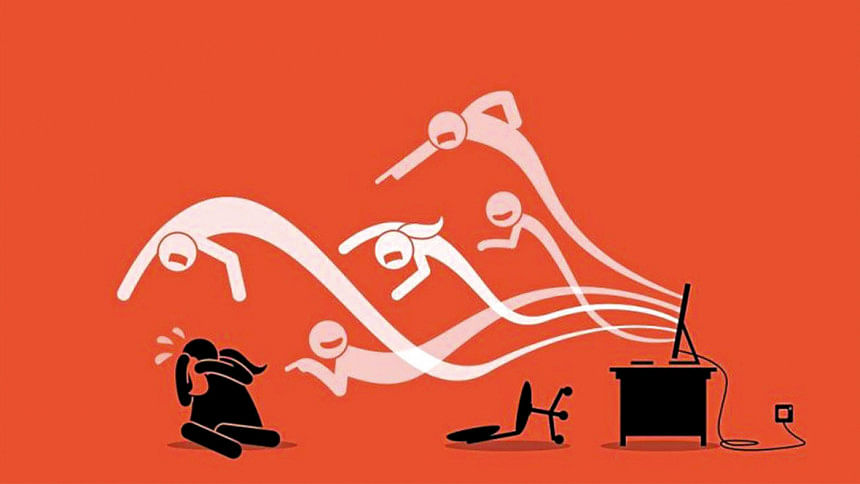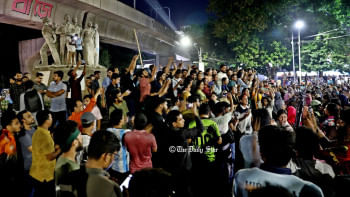Laws protecting victims from cyber harassment

Even though Bangladesh claims to be a digitally progressive country, the cases of cyber harassment are continuously on the rise. In the view of recent public outcry against cyber harassment, people need to be made aware of the relevant laws to protect themselves. Of the most prominent forms of harassment taking place digitally, defamation and victim-blaming are the most common. Somehow the general people of the country have gotten the idea that they are allowed to say whatever online without facing consequences.
From minor offences like sending obscene comments and pictures to a woman to major ones like blackmailing using private pictures of a woman who were taken without consent, the cyberspace is providing an unsafe environment for these women. There are cases of editing a person's pictures in an obscene way to ruin their reputation in the society. That cybercrimes like identity theft and others have become so common, most of the time the victims do not even realise the severity of these offences and ignore them without seeking legal help. A lot of times, even minor children fall victim to this kind of abuse and often take drastic steps without seeking help.
Since our society is yet to be victim-friendly, it is very often seen that the victim is blamed and stigmatised, specially when it comes to a woman. Whenever a private picture or information goes viral, most people tend to focus on a victim's actions and character rather than the criminal and offence. That is why in maximum cases the victims often tend to take the blame upon themselves for sharing the pictures privately and the most frightening thing is that it leads them to take drastic steps like suicide. Sadly, these women who are constantly subjected to victim-blaming also do not get adequate support from their family or society, so they do not feel the urge to take legal steps.
Even if the victims try to express their views and demand justice for the harassment, they face restrictions and intimidation from the elders of their family who fear for the family's reputation in society. They also face judgment and harassment from law enforcement officials while filing a case. These events are more common than we can imagine because, sadly, these cases remain outside the public domain for fear of further harassment or mockery. They are being constantly suppressed due to this stigma, the tendency of blaming the victims, ingrained gender stereotypes, fear of repression, power norms, and lack of protection for victims.
The laws which can be availed by victims of cyber harassment in Bangladesh include the Information and Communication Technology Act, 2006 (ICT Act); the Pornography Control Act, 2012 (PC Act); and the Digital Security Act, 2018 (DS Act). Section 63 of the ICT Act ensures punishment for disclosure of confidentiality and privacy with imprisonment or with a fine or both. Section 24 of the DS Act penalises identity fraud and provides sanctions for it whereas section 25 protects a person from the transmission or publication of offensive, false or threatening information regarding them through any digital medium. Section 29 of the DS Act protects a victim against defamation. Finally, section 8 of the PC Act has made the possession, distribution or use of any sort of pornographic material illegal. It has also included sanction for blackmailing using such materials and distributing them using the internet. With the proper implementation of all these laws, it is possible to ensure the safety of the people accessing the digital platforms. Towards realising our dream of 'Digital Bangladesh', it is necessary to build safe cyberspace for everyone accessing it.
Many victims are not aware of the help available in these cases. The law enforcement agencies have recently undertaken several initiatives to tackle such offences and have launched a hotline where victims can complain using the profile link or screenshots of the offender. Legal aid organisations like Ain o Shalish Kendra (ASK), Bangladesh Legal Aid and Services Trust (BLAST), Bangladesh National Women Lawyers' Association (BNWLA), etc. also provide assistance. A specialised branch of the police called the Police Cyber Support for women also provides the necessary advice and legal assistance.
THE WRITERS ARE STUDENTS OF LAW, UNIVERSITY OF DHAKA.

 For all latest news, follow The Daily Star's Google News channel.
For all latest news, follow The Daily Star's Google News channel. 



Comments